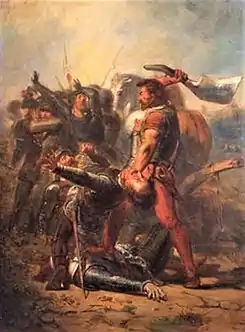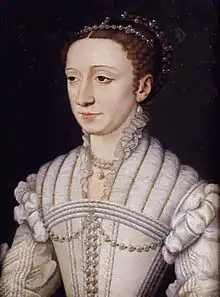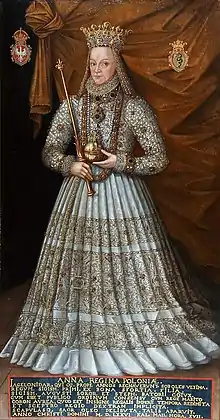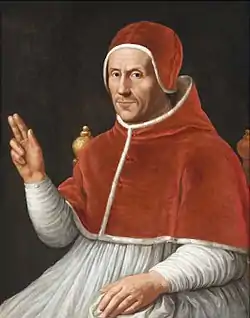1523
Year 1523 (MDXXIII) was a common year starting on Thursday (link will display the full calendar) of the Julian calendar.
| Millennium: | 2nd millennium |
|---|---|
| Centuries: | |
| Decades: | |
| Years: |
| 1523 by topic |
|---|
| Arts and science |
| Leaders |
|
| Birth and death categories |
| Births – Deaths |
| Establishments and disestablishments categories |
| Establishments – Disestablishments |
| Works category |
|
| Gregorian calendar | 1523 MDXXIII |
| Ab urbe condita | 2276 |
| Armenian calendar | 972 ԹՎ ՋՀԲ |
| Assyrian calendar | 6273 |
| Balinese saka calendar | 1444–1445 |
| Bengali calendar | 930 |
| Berber calendar | 2473 |
| English Regnal year | 14 Hen. 8 – 15 Hen. 8 |
| Buddhist calendar | 2067 |
| Burmese calendar | 885 |
| Byzantine calendar | 7031–7032 |
| Chinese calendar | 壬午年 (Water Horse) 4219 or 4159 — to — 癸未年 (Water Goat) 4220 or 4160 |
| Coptic calendar | 1239–1240 |
| Discordian calendar | 2689 |
| Ethiopian calendar | 1515–1516 |
| Hebrew calendar | 5283–5284 |
| Hindu calendars | |
| - Vikram Samvat | 1579–1580 |
| - Shaka Samvat | 1444–1445 |
| - Kali Yuga | 4623–4624 |
| Holocene calendar | 11523 |
| Igbo calendar | 523–524 |
| Iranian calendar | 901–902 |
| Islamic calendar | 929–930 |
| Japanese calendar | Daiei 3 (大永3年) |
| Javanese calendar | 1440–1442 |
| Julian calendar | 1523 MDXXIII |
| Korean calendar | 3856 |
| Minguo calendar | 389 before ROC 民前389年 |
| Nanakshahi calendar | 55 |
| Thai solar calendar | 2065–2066 |
| Tibetan calendar | 阳水马年 (male Water-Horse) 1649 or 1268 or 496 — to — 阴水羊年 (female Water-Goat) 1650 or 1269 or 497 |
| Wikimedia Commons has media related to 1523. |

The Frisian rebellion ends, fought by the Arumer Black Heap
Events
January–June
- January 20 – Christian II is forced to abdicate as King of Denmark and Norway.
- May – The Ningbo Incident: Two rival trade delegations from Japan feud in the Chinese city of Ningbo, resulting in the pillage and plunder of the city.
- June 6 – Gustav Vasa is elected king of Sweden, finally establishing the full independence of Sweden from Denmark, which marks the end of the Kalmar Union. This event is also traditionally considered to be the establishment of the modern Swedish nation.
July–December
- c. July – Martin Luther's translation of the Pentateuch into German (Das allte Testament Deutsch) is published.
- July 1 – Jan van Essen and Hendrik Vos become the first Flemish Lutheran martyrs, burned at the stake by Roman Catholic authorities in Brussels.
- July 7 – Wijerd Jelckama, a Frisian warlord and military commander, is executed in Leeuwarden, ending the Frisian rebellion fought by the Arumer Black Heap.
- September 22 – Spanish conquest of Nicaragua: Agreement for an expedition by conquistadores into Nicaragua.
- November 19 – Following the death of Pope Adrian VI, the Medici cardinal is elected 219th pope as Clement VII.
Date unknown
- The Ming dynasty Chinese navy captures two Western ships with Portuguese breech–loading culverins aboard, which the Chinese call a fo–lang–ji (Frankish culverin). According to the Ming Shi, these cannons are soon presented to the Jiajing Emperor by Wang Hong, and their design is copied in 1529.[1]
- Franconian War: The Swabian League destroys 23 robber baron castles.
- In northern Italy, a French army tries to recover Milan but fails due to an offensive by Spanish, Imperial and English troops.
Births
- January 29 – Enea Vico, Italian engraver (d. 1567)
- February 1 – Francesco Abbondio Castiglioni, Italian Catholic cardinal (d. 1568)
- February 13 – Valentin Naboth, German astronomer and mathematician (d. 1593)
- February 20 – Jan Blahoslav, Czech writer (d. 1571)
- March 17 – Giovanni Francesco Commendone, Italian Catholic cardinal (d. 1584)
- March 21 – Kaspar Eberhard, German theologian (d. 1575)
- April 5 – Blaise de Vigenère, French diplomat and cryptographer (d. 1596)
- April 21 – Marco Antonio Bragadin, Venetian lawyer and military officer (d. 1571)
- June 5 – Margaret of France, Duchess of Berry (d. 1574)
- July 4 – Pier Francesco Orsini, Italian condottiero and art patron (d. 1583)
- July 18 – Duke George II of Brieg (1547–1586) (d. 1586)
- September 21 – Sancho d'Avila, Spanish general (d. 1583)
- September 22 – Charles, Cardinal de Bourbon, French church leader and pretender to the throne (d. 1590)
- October 10 – Ludwig Rabus, German martyrologist (d. 1592)
- October 11 – Eleonore of Fürstenberg, wife of Philip IV, Count of Hanau-Lichtenberg (d. 1544)
- October 18 – Anna Jagiellon, daughter of Sigismund I of Poland (d. 1596)
- date unknown
- Gabriele Falloppio, Italian anatomist and physician (d. 1562)
- Martín Cortés, Spanish conquistador (d. 1589)
- Francisco Foreiro, Portuguese Dominican theologian and biblist (d. 1581)
- Gaspara Stampa, Italian poet (d. 1554)
- probable – Crispin van den Broeck, Flemish painter (d. 1591)
- possible – Catherine Howard, fifth queen of Henry VIII of England, (b. between 1518 and 1524; executed 1542)
Deaths
- February 4 – Thomas Ruthall, English chancellor of the University of Cambridge
- March 28 – Louis I, Count of Löwenstein, founder of the House of Löwenstein-Wertheim (b. 1463)
- April 6 – Henry Stafford, 1st Earl of Wiltshire, English nobleman (b. 1479)
- May 7
- Antonio Grimani, Italian admiral (b. 1434)
- Franz von Sickingen, German knight (b. 1481)
- May 23 – Ashikaga Yoshitane, Japanese shōgun (b. 1466)
- May 24 – Henry Marney, 1st Baron Marney, English politician (b. 1447)
- July 1 – Johann Esch and Heinrich Voes, Flemish Lutheran martyrs
- July 7 – Wijerd Jelckama, Frisian rebel and warlord (b. 1490)
- August 13 – Gerard David, Flemish artist (b. c. 1455)
- August 27 – Domenico Grimani, Italian nobleman (b. 1461)
- August 29 – Ulrich von Hutten, Lutheran reformer (b. 1488)
- September 14 – Pope Adrian VI (b. 1459)
- October 5 – Bogislaw X, Duke of Pomerania (1474–1523) (b. 1454)
- October 11 – Bartolomeo Montagna, Italian painter (b. 1450)
- November 10 – Lachlan Cattanach Maclean, 11th Chief, Scottish clan chief (b. 1465)
- October – William Cornysh, English composer (b. 1465)
- date unknown
- Cecilia Månsdotter, Swedish noble (b. c. 1476)
- Alessandro Alessandri, Italian jurist (b. 1461)
- Pietro Perugino, Italian painter (b. 1446)
References
- Keay, John (2008). China: A History. London: HarperPress. ISBN 9780007221776. 0007221770.
The 'breech-loading culverins presented at the Ming court in 1522' were a gift from the Portuguese; and Portuguese arquebuses were acquired in the 1540s by the Japanese, who copied and greatly improved them.
This article is issued from Wikipedia. The text is licensed under Creative Commons - Attribution - Sharealike. Additional terms may apply for the media files.



